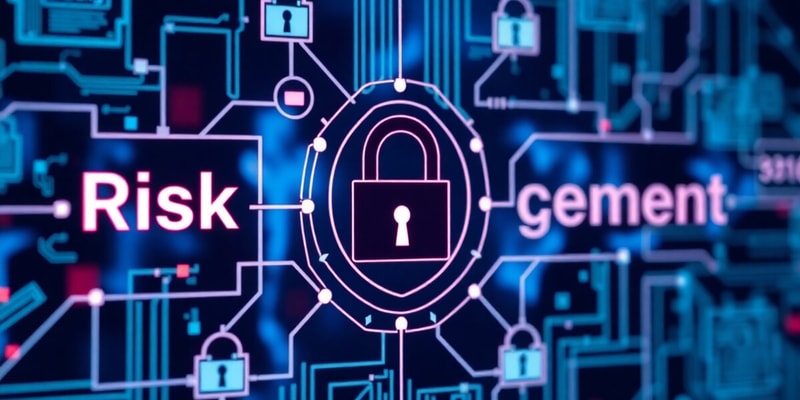Podcast
Questions and Answers
What is the primary role of security controls?
What is the primary role of security controls?
Which type of control focuses primarily on governance and administrative aspects of information security?
Which type of control focuses primarily on governance and administrative aspects of information security?
What are preventive controls designed to do?
What are preventive controls designed to do?
Which of the following is an example of a technical control?
Which of the following is an example of a technical control?
Signup and view all the answers
Which category of security controls includes measures like backup procedures and awareness training?
Which category of security controls includes measures like backup procedures and awareness training?
Signup and view all the answers
Which of the following best describes physical controls?
Which of the following best describes physical controls?
Signup and view all the answers
What is a key characteristic of operational controls?
What is a key characteristic of operational controls?
Signup and view all the answers
Which control type is NOT part of the 'Prevent, Detect, React' security model?
Which control type is NOT part of the 'Prevent, Detect, React' security model?
Signup and view all the answers
What is the primary purpose of deterrent controls?
What is the primary purpose of deterrent controls?
Signup and view all the answers
Which of the following is an example of corrective controls?
Which of the following is an example of corrective controls?
Signup and view all the answers
What is the role of detective controls?
What is the role of detective controls?
Signup and view all the answers
Which of the following best describes compensating controls?
Which of the following best describes compensating controls?
Signup and view all the answers
Which type of control focuses on policies and procedures to guide behavior?
Which type of control focuses on policies and procedures to guide behavior?
Signup and view all the answers
In an e-commerce platform, which of the following is a detective control?
In an e-commerce platform, which of the following is a detective control?
Signup and view all the answers
What type of control includes systems that manage software vulnerabilities?
What type of control includes systems that manage software vulnerabilities?
Signup and view all the answers
What is a key characteristic of deterrent controls?
What is a key characteristic of deterrent controls?
Signup and view all the answers
Study Notes
Security Controls
- Security controls are mechanisms, policies, or procedures to protect assets and data.
- Their goal is to reduce risks by preventing, detecting, or mitigating threats.
- Understanding control types is critical for security infrastructure and certifications like CompTIA Security+.
- The "Prevent, Detect, React" model is helpful for categorizing controls.
Categories of Security Controls
-
Technical Controls (Logical Controls): Implemented through technology.
- Examples: firewalls, intrusion detection systems (IDS), encryption.
- Often require software or hardware components for policy enforcement.
-
Managerial Controls: Focus on governance and administration.
- Policies, procedures, guidelines, and best practices.
- Examples: risk assessments, data classification policies, security training.
-
Operational Controls: Procedures and mechanisms guided by managerial controls.
- Often technology-driven, but involve human actions.
- Examples: backup procedures, incident response, awareness training.
-
Physical Controls: Tangible aspects of information security.
- Security cameras, biometric scanners, physical intrusion detection systems.
- Basic security measures like door locks and visitor logs are included.
Types of Security Controls
-
Preventive Controls: Stop events or actions before they occur.
- Firewalls, access control lists, strong authentication.
-
Deterrent Controls: Discourage potential attacks.
- Warning signs, visible security presence.
-
Detective Controls: Discover or identify unwanted activities.
- System monitoring, auditing, intrusion detection systems (IDS).
-
Corrective Controls: Mitigate security incidents.
- Patch management, system restoration plans.
-
Compensating Controls: Secondary controls used when primary controls aren't feasible.
- Used as interim measures to provide similar protection.
- Example: MFA if smart cards are too expensive.
-
Directive Controls: Guide people, rather than enforcing technology.
- Guidelines, procedures, or policies to manage security practices, such as password changes.
Case Studies
- Healthcare Organization: Used technical, managerial, and physical controls to secure patient data.
- Online Retailer: Deployed preventive and detective controls (WAF, IDS) and compensating controls (CAPTCHA) to combat cyber threats.
Summary
- Categorizing controls (technical, managerial, operational, physical) and their types (preventive, deterrent, detective, corrective, compensating, directive) is key to a robust security strategy.
- Combining these controls creates a layered approach to cybersecurity.
Key Points (from Page 3)
- Security controls maintain integrity, availability, and confidentiality.
- They're categorized into the four main types, with further sub-classifications.
Review Questions (from Page 3)
- What are the four main categories of security controls?
- Give examples of preventive and detective controls.
- What is the primary function of directive controls?
- How do compensating controls differ from corrective controls?
Practical Exercises (from Page 3)
- Map out your organization's security controls, categorizing each.
- Create flashcards or tables to better understand the types of controls.
- Apply real-world examples and scenarios to deepen security knowledge.
Studying That Suits You
Use AI to generate personalized quizzes and flashcards to suit your learning preferences.
Related Documents
Description
This quiz covers the various types of security controls designed to protect assets and data. It will explore technical, managerial, and operational controls, emphasizing their roles in risk management and security certifications like CompTIA Security+. Test your understanding of the 'Prevent, Detect, React' model and how it categorizes these essential controls.




